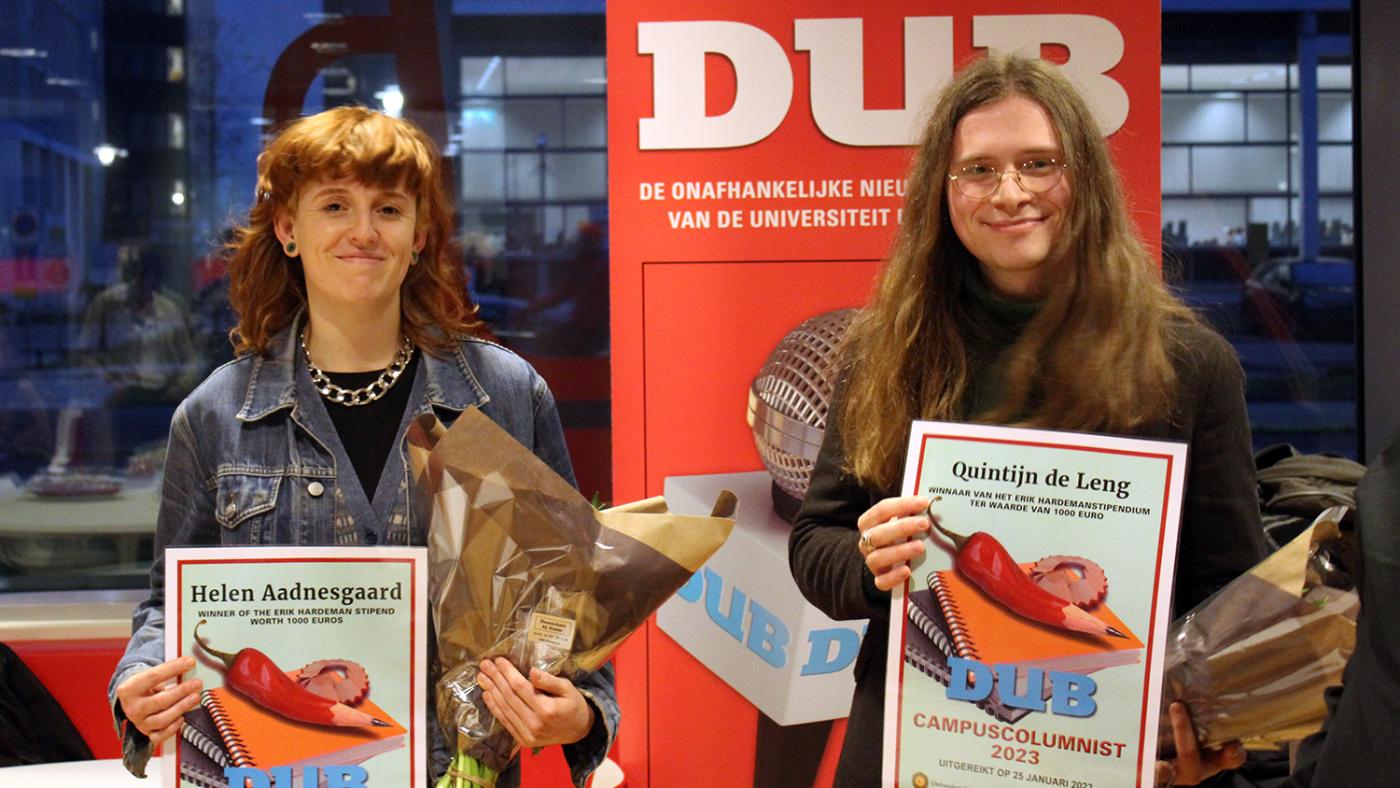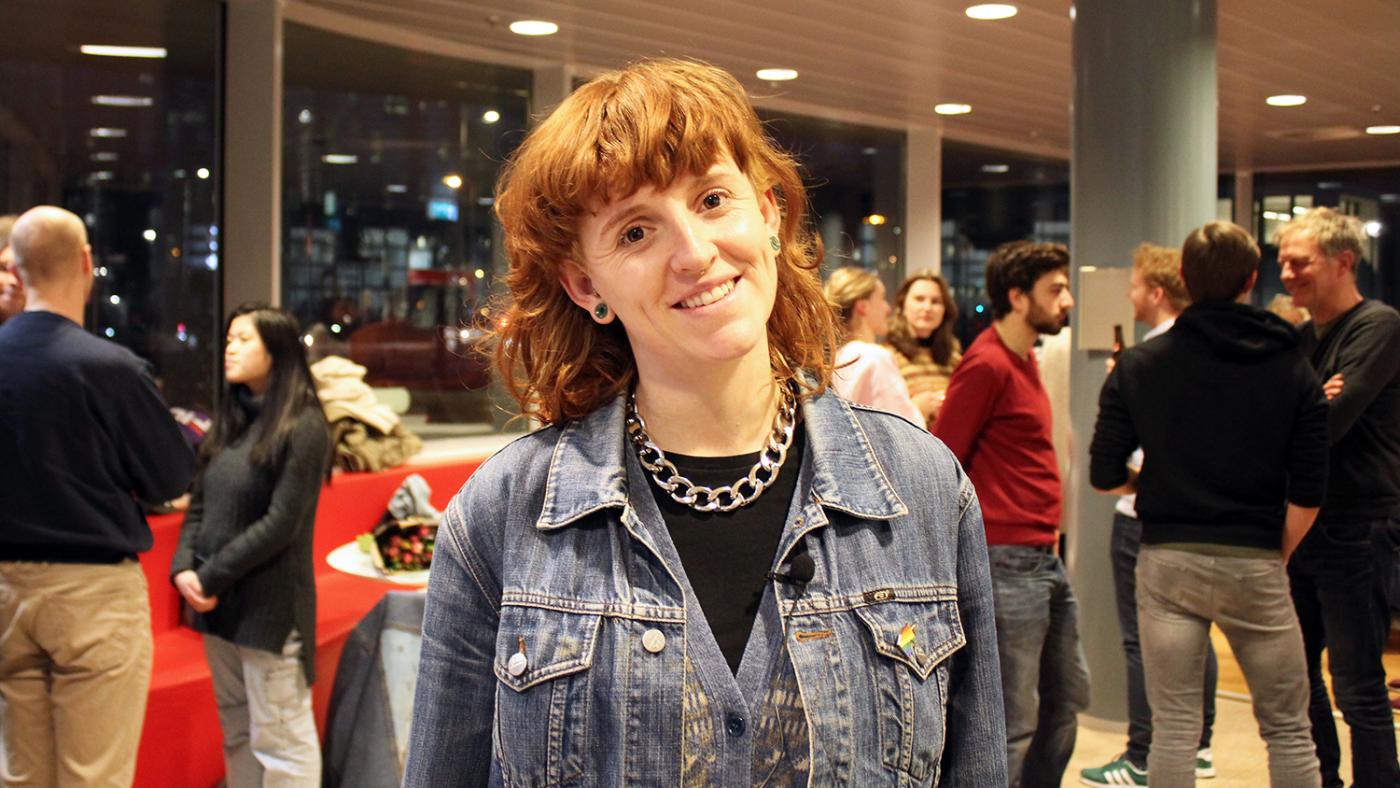2023 campus columnists share their experiences
‘I thought that only five people read my columns’

Helen: “It felt like I was sending letters to a mailbox that was never opened.”
Helen Aadnesgaard (29) graduated this year with a Master’s degree in Gender Studies. As a campus columnist, she writes for DUB’s English page. She comes from Johannesburg, South Africa, and works as a professional writer in addition to writing her DUB columns. “The column format took a lot of getting used to for me because it’s only about my feelings and thoughts, and I’m not used to doing that in my work.”
How did you find writing the columns?
“Sometimes I loved it and sometimes I hated it. I often didn’t like it as much because I had to do many other things besides writing the columns. Sometimes it would only take me 45 minutes to write my piece, while at other times, it took me five hours until I got in the flow. Since I write for a living in addition to the DUB columns, I want to come across as professional and not bring something bad into the world that can be found and read by everyone.”
Where do you get your inspiration from?
“Every now and then, I'll have a conversation with someone and think: 'Gosh, that's an interesting topic to write about. And then I'll add it to a list on my phone. I also asked my girlfriend for advice often. She often said: 'Here are all the things you couldn’t stop talking about.' Sometimes I used something from that list, but sometimes I didn’t. In any case, it’s just really nice to spar with someone about topics.”
Which column are you most proud of?
I really thought the feminist Illuminati one was a killer. I made jokes about gender inequality, ridiculed the university, and referred to other columns and blogs, which I criticised. I also really liked the format of the column, because it was a job advert. In addition, the topic is close to my heart because I think it’s bad that women tend to get fewer promotions and are paid less than men. This column was stronger and more thoughtful than the others I’ve written.”
How do people react to your columns?
“Three people left a comment on the website. Some people have also stopped me to ask if I was the campus columnist and they told me that they enjoyed reading my columns. In the beginning, when I had just won the competition, some people I went on dates with knew I was the campus columnist, which was very strange. But, overall, I’ve received very little feedback. I think the English columns are read very little anyway.”
I then told Helen that her columns received 200 and 500 visits.
“What? I am so amazed at these figures. You’re really blowing me away, I had no idea. I thought only five people read my columns.”
At the beginning of the year, you said you wanted to overcome your fears by writing the columns. Do you think you've succeeded in that?
“I think I was talking about the fear of getting my own voice out there. To really do something for myself, not for a client. Honestly, I don’t think I’ve overcome that fear. I honestly thought that only five people read my work. But my adventure would have been drastically different had I known there were many more readers. It felt like I was sending letters to a mailbox that was never opened.”
Do you have any tips for the next columnists? “Write as if no one will read it and as if everyone you know will read it. Give yourself time, don’t take yourself too seriously, and enjoy the ride.”

Helen Aandesgaard.
Quintijn: “Don’t be afraid to wait until the last minute.” Quintijn de Leng (25) started the Research Master’s programme in Urban Global Transformations this year. He writes for DUB’s Dutch-language page. Since becoming a campus columnist, he has been paying more attention to small, everyday things: “I love that you can turn a small topic, like choosing a coffee mug, into an interesting story.”
How did you find writing the columns?
“I really liked it, actually. I noticed that I started to push myself to observe things more keenly. What is happening here? I pay much more attention to details now than I did before I started writing the columns. That is really valuable because it allows me to live more in the moment. I also like the frequency of writing once every three weeks. It was enough to excite myself in a fun way, but it wasn’t so much that it caused stress or pressure for me.”
Where do you get your inspiration from?
“Mostly from my surroundings. From what I see around me and what I experience on a daily basis. But also from my close contacts. What they tell me and what I think of it. For example, I once asked my girlfriend to help me come up with a topic. I can’t think of any examples, but it was useful to brainstorm about topics.”
Have you ever received responses to your columns?
“Yes, definitely. When people came up to me in real life, it was always very positive. Discussions were started online, especially underneath the column about calling in sick for a lecture. But there were people with chronic illnesses who felt exactly how I described. That’s nice to see, it's nice that people can relate to my columns."
What did you think of Helen’s columns?
“I noticed that she was going deeper with her columns. I really enjoyed reading that effort. I find it hard to turn deeper thoughts into words. For me, writing the columns was fun because I could draw attention to small, trivial things.”
When you started out as a campus columnist, you said you hoped to write about personal things. Do you think you did?
“I think I've succeeded, yes. Most of the subjects are close to my heart. These are all things that I have observed myself and that I have an opinion about.”
You also said that you wanted to encourage readers to look at everyday things from a different angle instead of taking them for granted. Do you think you've managed to do that?
“I think I’ve been pretty successful at that because I've been focusing on details. But I could have explored it a bit more, maybe. It’s not my priority to continue writing right now, but who knows what the future holds.”
Do you have any tips for the next columnists?
“Don’t be afraid to wait until the last minute to write, because that’s when the most creative things arise. With limited time come a lot of possibilities.”

Quintijn de Leng.
 DUB is looking for two campus columnists in 2024!
DUB is looking for two campus columnists in 2024!
Do you have what it takes to take Helen and Quintijn's spot? Then don't hesitate to participate in the campus columnist competition! As usual, DUB is looking for two columnists: one for the Dutch page and one for the English page. To join the contest, all you have to do is send us two columns, which will be anonymised and evaluated by a panel of experts. The winners will publish a column every three weeks throughout 2024. They will also get the Erik Hardeman stipend (1,000 euros for each columnist). The contest is open to all students and employees of Utrecht University. Campus columnists are expected to comment on topics related to the university or to student life. See all requirements here.